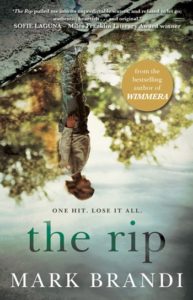’The Rip’ by Mark Brandi
Best known for his award-winning and best-selling book ‘Wimmera’, Mark Brandy has also written numerous short pieces for the press.

His just released book, ‘The Rip’, promises to be another resounding success. It is an intelligent, insightful and original book, while also being one of the easiest books to read.
It is the story of two street people, a young woman named Dani and her constant male companion, Anton, and Dani’s dog, Sunny.
The entire book is narrated by Dani. This enhances the sense that this book is a first hand account by an outsider. In this sense, it is unlike books about outsiders, written by insiders imagining what it must be like to be an outsider. When we read what a drug user or street prostitute says about their life, we tend to read what they wants us, the haves, to read about their life as a have-not. Dani’s narration, on the other hand, is clearly distinguishable from her accounts of what she actually says to people. The book also uncovers the complexities and nuances that typical discussions of our society’s haves and have-nots, overlook.
When we meet this trio, they are living rough in Princess Park – which surprisingly is their preferred residence. Mark Brandi takes us into another world, a world that is a mystery to almost all of us. We are introduced to this world incrementally revealing the drug taking, begging, prior jail terms, and that Dani occasionally turns tricks.
As the author lives in Melbourne, he paints a recognisable inner city setting for the story which is consequently made all the more believable and accessible. The characters we meet tend not to be what we’ve come to expect of those in their surroundings. The closest we come to such predictability is the psychopathic-like Steve, with whom Dani and Anton come to live.
We read accounts of burglaries, time spent in prison and involuntary mental health wards, domestic violence, drug taking, and overdosing. However Because they are presented in a matter of fact manner the focus is swung to the personal and contextual, and away from the gratuitously sordid.
Notably, in this book there is neither glorification or passing of judgment on the unemployed, homeless, prostitutes, thieves or drug users. Instead, the book is a study of genuine friendship, and of society’s often clumsy and ill-directed attempts to help those who find themselves living on the fringes of society. In passing, the narrator also observes that those who do offer the most effective assistance may not necessarily be those expected to do so.
I was particularly impressed with the highly intelligent manner in which Dani deals with loss and the harsh realities of life. I suspect that in the absence of her admirable coping mechanisms the storyline would be sad, bleak and depressing. It is her perspective that enables an inspiring, if not altogether happy, conclusion.